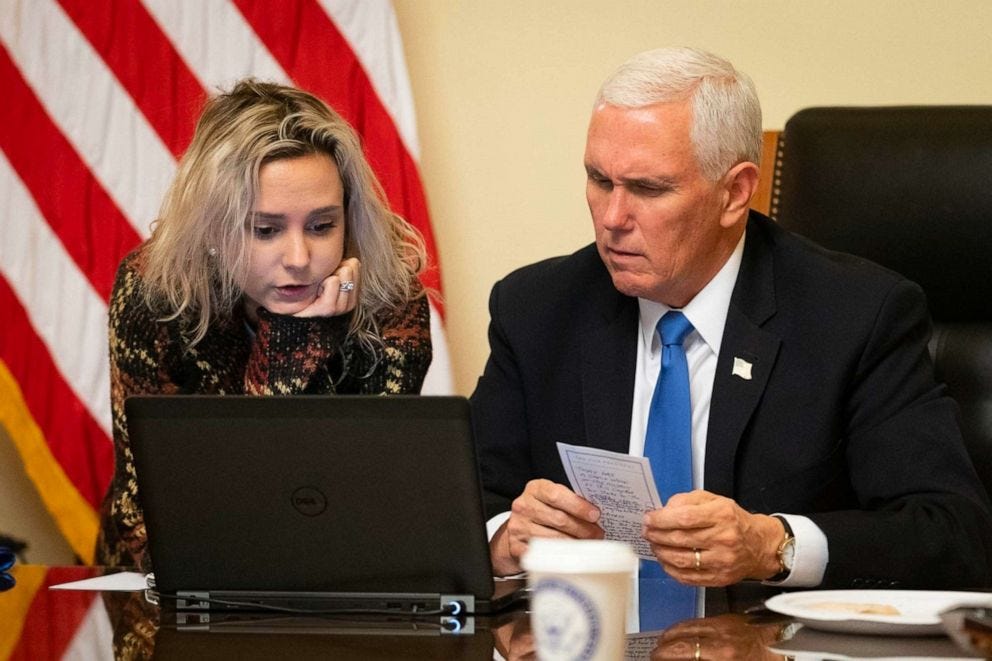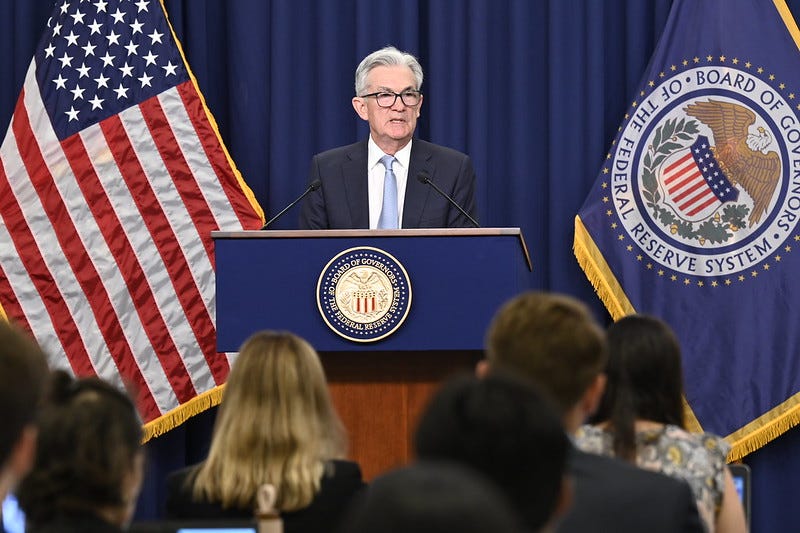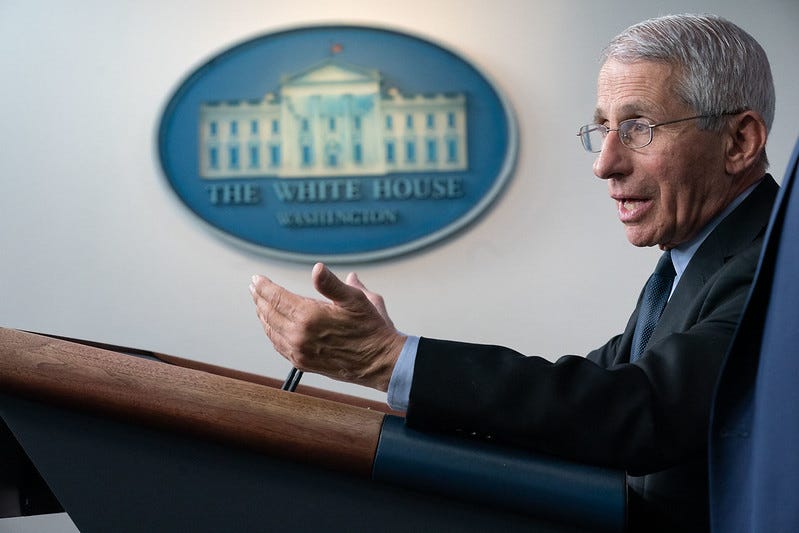Wake Up To Politics - June 16, 2022
Wake Up To Politics: Is the U.S. nearing a recession?
by Gabe Fleisher
Good morning! It’s Thursday, June 16, 2022. Election Day 2022 is 145 days away. Election Day 2024 is 873 days away.
We’ve got a packed newsletter for you this morning. Economics contributor Davis Giangiulio, a fellow student journalist, has the lead story — breaking down everything you need to know about the Fed’s interest rate hike yesterday and what it means for the economy.
Then, I’ve got a preview for you of today’s January 6 hearing, followed by an answer to a reader question about prosecuting the former president. As always, we’ll close with a look at what else is going on in D.C. today and a more positive story.
Thank you very much for reading. Let’s dive in:
Is the U.S. nearing a recession?
By Davis Giangiulio, economics contributor
The Federal Reserve raised interest rates by 75 basis points, or three-quarters of a percent, on Wednesday. The announcement came after the Federal Open Market Committee’s June meeting and is the largest hike in rates since 1994. It’s the Fed’s third rate increase this year, as the economy continues to fight soaring inflation.
What does that mean? The hike raises the Federal Funds Rate, which is the interest rate at which banks and credit unions lend money to each other. While this makes borrowing between banks more expensive, it also affects consumers, as institutions make up for their higher costs by placing higher interest rates on their customers.
Therefore, interest payments across the entire economy are expected to rise — with everything from home mortgages to credit card debt to car loans impacted.
While the Fed was always expected to raise rates again this month, pressure mounted to raise them by such a drastic figure after last week’s May inflation report. The Consumer Price Index rose 8.6% in May compared to the year before, the steepest increase since December 1981.
The rising inflation has been blamed on a range of sources, including government stimulus packages pumping too much money into the economy, supply chain inefficiencies, China’s “zero COVID” policy slowing down the production of critical goods, and the Russian invasion of Ukraine.

Fuel oil prices are up more than 100% over the last year, and jumped by 16.9% alone in May. But people aren’t just paying more for gas: shelter prices are up 5.5% over the last year, and food prices have risen 10.1%, including a 1.2% hike in the last month.
That’s why the Fed raised rates by so much. There was hope that the Fed wouldn’t have to be as aggressive if inflation slowed, but once it was clear it was still persisting, many economists urged the Fed to take the stronger posture. Without this step, those economists argue, inflation would only worsen and the Fed would have to act more drastically down the line, creating a deep recession.
But fears of a recession won’t go away, even with the Fed’s dramatic rate hike. A 75 basis point rise in interest rates is still extremely steep, and Fed Chair Jay Powell said the central bank could hike rates by the same amount again in July. Consecutive high spikes in rates can decrease investment in the economy as consumers and businesses find it more expensive to borrow and therefore decrease demand enough that a recession occurs.
This is why the Fed’s job is so difficult: they have to simultaneously raise rates fast enough to crush inflation, while not moving so aggressively that they bring down the entire economy with it. The Fed wants prices to come down and the economy to cool, in other words, but not so much that it sparks a new recession.
Consumers already have little confidence in the economy. Last week, the University of Michigan’s Index of Consumer Sentiment hit a record low of 50.2, a level comparable to where it was during the 1980s recession, another economic contraction that occurred at a time of high inflation. A Morning Consult consumer confidence reading has levels below that of April 2020, when the worst of the pandemic’s economic effects were in full force.
But considering the low unemployment, continuing high level of job creation, and the fact households are generally doing well financially, how can it be that many feel a recession is near or already started?
That’s because there are warning signs in the economy right now. GDP in the first quarter fell 1.5%, and an influential forecaster predicts zero growth in the second quarter. Consumer spending declined in May, which is a sign that people are starting to feel the effects of higher prices and adjusting accordingly. The Fed also lowered its expectations for growth for the next three years on Monday, while also increasing its unemployment estimates for the same period.
And the S&P 500 is down 20% from its all-time high, a figure that signals it’s in bear market territory, a position the index is typically in during recessions.
Still, the economy isn’t officially in a recession — at least not yet. The National Bureau of Economic Research hasn’t declared one, though they usually are a lagging messenger, and GDP hasn’t yet fallen in two consecutive quarters, a common definition.
But consumers are already watching their purchasing power fall, even as they experience rising wages. In the last year, prices have risen 8.6%, but average hourly earnings have risen by only 5.2%, which means consumer power has weakened by 3.4% overall. Consumers, therefore, are left in a troubling economic position, one that can make it feel like a recession even if one hasn’t officially started yet.
Indeed, with the pace the Fed is moving in raising rates, the U.S. could find itself in an official recession as early as the end of the year. Until then, pressure will be on Powell and the Fed to do everything possible to secure a less-booming economy without sending it into contraction.
Hearing preview: Pence advisers to testify before Jan. 6 committee
The House January 6 committee will hold its third public hearing at 1 p.m. Eastern Time today. Here’s what you need to know:
Today’s focus: Although he won’t testify himself, former Vice President Mike Pence will be the star of today’s hearing. The session will focus on former President Trump’s efforts to pressure Pence to overturn the 2020 election results in the days before the January 6 Electoral College certification, which Pence presided over.
The committee is also expected to draw a through-line between Trump’s pressure campaign and the threats made against Pence during the January 6 riots outside the Capitol.
Trump’s response to those threats will likely be examined as well. At the committee’s first hearing, vice chair Liz Cheney (R-WY) revealed that the panel had testimony that — when told rioters were chanting “hang Mike Pence” — Trump responded that his VP “deserves” it, adding: “Maybe our supporters have the right idea.”

One name you can expect to come up: John Eastm an. He was the conservative constitutional law professor who served as an outside adviser to Trump in the post-election period, becoming a key promoter of the widely rejected theory that Pence had the power to change the outcome of the election on January 6.
In a preview of today’s hearing, the committee released a video earlier this week showing a clip from the panel’s deposition with former Trump White House lawyer Eric Herschmann, who recounted a conversation with Eastman on January 7.
“I’m going to give you the best free legal advice you’re ever getting in your life,” Herschmann remembered telling Eastman, who was still trying to brainstorm ways to overturn the election even after it had been certified. “Get a great f’ing criminal defense lawyer. You’re going to need it.”
The witnesses: The panel will hear live testimony from Greg Jacob, Pence’s former counsel, and J. Michael Luttig, a retired conservative federal judge.
Both witnesses were key advisers to Pence during the days leading up to January 6, encouraging him to ignore Eastman’s theories and stick to his ceremonial role during the Electoral College certification.
“It is breathtaking that these arguments even were conceived, let alone entertained by the President of the United States at that perilous moment in history,” Luttig wrote in a statement to the committee, per CNN. “Had the Vice President of the United States obeyed the President of the United States, America would immediately have been plunged into what would have been tantamount to a revolution within a paralyzing constitutional crisis.”

“America's democracy was almost stolen from her,” he will say today, according to CBS News.
As during its previous hearings, the committee will also make use of video clips from its pre-taped depositions. One witness who previously spoke to the committee who you can expect to hear from is Pence’s former chief of staff, Marc Short. The New York Times reported earlier this month that, the day before the Capitol riot, Short personally warned Pence’s lead Secret Service agent that the VP might face a security risk the next day because of the president’s rhetoric.
More Jan. 6 news: Some other pieces of news that came out of the committee’s investigation on Wednesday...
New emails revealed by the Washington Post that show Eastman and Ginni Thomas, the wife of Supreme Court justice Clarence Thomas, discussing efforts to overturn the election.
...And an Eastman email reported by the New York Times citing knowledge of a “heated fight” within the Supreme Court over whether to take up cases related to the election. Are the two disclosures connected?
Plus: the committee released more information on a January 5 tour of the Capitol complex given by Rep. Barry Loudermilk (R-GA), including photos of the tourists taking picture at strange spots and video of one of them outside the Capitol, yelling threats against lawmakers, the next day.
More headlines to know
Covid: “FDA advisers vote in favor of authorizing Covid-19 vaccines for children as young as 6 months” (CNN)
“Dr. Anthony Fauci tests positive for Covid, is having mild symptoms” (CNBC)
Ukraine: “U.S. sending $1 billion more military aid to outgunned Ukraine” (Associated Press)
“U.S. veterans missing in Ukraine, feared captured, families say” (Washington Post)
White House: “Biden signs executive order to address conversion therapy, anti-LGBTQ bills” (USA Today)
“Biden pushes fuel makers to boost capacity, criticizes profits” (Wall Street Journal)
Climate: “Extreme weather slams the U.S., from flooding to fires” (Axios)
Ask Gabe: Could D.C. charge Trump?
Q: “If Merrick Garland decides against charging Trump for either civil or criminal violations, does the D.C. district attorney have standing to bring charges?” — Glenn from New York City
A: Washington, D.C. doesn’t have a traditional district attorney: because of its status as a federal district, the U.S. attorney for the District of Columbia also acts as D.C.’s district attorney. That means that the U.S. attorney in D.C. not only prosecutes federal offenses like other U.S. attorneys, but most major local crimes as well (which is what a district attorney would normally do).
The U.S. attorney in D.C., currently Matthew Graves, does report to Attorney General Merrick Garland — so he would not be able to bring any charges against the former president without approval from the AG.
However, D.C. also has its own attorney general, Karl Racine, who acts somewhat like a city attorney (focusing on civil cases, unlike district attorneys who focus on criminal cases), although he can also bring charges for some minor crimes.
So Racine could theoretically charge Trump under those authorities — as he noted in the days after the Capitol riot, when he floated charging Trump with a misdemeanor for inciting violence, which carries a maximum sentence of six months in jail.
There’s no evidence that Racine has moved forward with any criminal investigation of Trump, although he has separately filed a civil lawsuit against members of the the Proud Boys and Oath Keepers related to January 6, and could theoretically bring a similar lawsuit against Trump to pay damages or face another form of civil liability. (There are already members of Congress and Capitol Police officers who have brought civil lawsuits seeking to force Trump to pay damages for January 6, and a judge has ruled that Trump is not immune from such suits and allowed them to proceed.)
In all likelihood, though, more than any prosecutor in D.C., it’s a district attorney down in Georgia — also outside of the Justice Department’s operating structure — who Trump has more to fear from.
What’s going on in government today
All times Eastern. Click on an event’s time to watch it.
— President Biden will receive his daily intelligence briefing (10:30 am) and hold a bill signing (3:10 pm) for S. 3580, the Ocean Shipping Reform Act.
The bipartisan bill aims to ease supply chain backlogs by empowering the Federal Maritime Commission to bar foreign ocean carriers from “unreasonably declining” U.S. exports, charging extraneous shipping fees, and engaging in other practices that have contributed to rising prices for consumers.
— Vice President Harris will participate in a call with reporters on the Biden administration’s efforts to improve maternal health outcomes (10 am) and deliver remarks announcing the launch of the White House Task Force to Address Online Harassment and Abuse (1:40 pm).
— First Lady Biden will deliver remarks (8 pm) at the opening of the first gallery of the future National Museum of the American Latino, which is slated to eventually become a full Smithsonian museum on the National Mall.
— White House press secretary Karine Jean-Pierre will hold her daily press briefing (12:15 pm).
— The Senate will convene (10 am) and resume consideration of H.R. 3967, the Honoring our PACT Act, which would offer health care access and benefits to veterans exposed to toxic substances during their military service.
The chamber will vote on passage of the legislation (11:15 am), followed by cloture votes to advance the nominations of Ana Isabel de Alba to be a U.S. District Judge for the Eastern District of California and Mary Boyle to be a member of the Consumer Product Safety Commission.
The Senate may also hold a vote (1:45 pm) to advance the nomination of Steve Dettalbach to be Director of the Bureau of Alcohol, Tobacco, Firearms, and Explosives (ATF).

— The House will convene (9 am) to debate and vote on H.R. 7606, the Lower Food and Fuel Costs Act, a largely bipartisan package aimed at combatting rising food and gas prices.
To target gas prices, the measure would authorize $200 million in grants geared at boosting production of ethanol, a lower-cost alternative to gasoline, and would allow E15 fuel to be sold year-round. (E15 is a cheaper type of fuel that’s 15% ethanol; it is generally banned in the summertime due to environmental concerns.)
To target food prices, the bill would create an Agriculture Department office with authority to investigate allegations that meat packers are unfairly consolidating, allowing them to drive up food prices because of a lack of competition. Additionally, the measure would establish a loan program for newer meat processors to drive competition in the industry, while also creating a task force to study America’s food supply chain.
— The House January 6th committee will hold its third public hearing (1 pm). Today’s session will focus on former President Trump’s pressure campaign urging his vice president, Mike Pence, to overturn the results of the 2020 election.
Greg Jacob, Pence’s former counsel, and J. Michael Luttig, a retired conservative federal judge, will testify. Both men were key advisers to Pence during the post-election period.
— Other congressional committee hearings include a Senate hearing on the federal Covid-19 response (9:30 am). CDC director Rochelle Walensky and FDA commissioner Robert Califf are scheduled to testify, as is Dr. Anthony Fauci, who will testify virtually due to his Covid diagnosis.
— House Speaker Nancy Pelosi will hold her weekly press conference (10:45 am).
— The Supreme Court will meet for its weekly conference to discuss pending cases and petitions.
Correction
A photo caption in Wednesday’s newsletter misstated the election result in the Republican primary in South Carolina’s 7th district. Rep. Tom Rice (R-SC) lost the race, as stated in the text of the newsletter.
I’m very sorry for that error and any confusion. Thanks to all of you who pointed it out!
Before I go...
Here’s some positive news that might have flown under your radar: Approximately two-thirds of the world — 66% of people — have now received at least one dose of a Covid-19 vaccine.
Of course, that means there are plenty of vaccines that still need to be administered — but it is still a historic and awe-inspiring accomplishment, especially when considering the speed with which these groundbreaking shots have been developed and then distributed across the world.
And it’s an accomplishment that continues to unfurl every day, under-the-radar, getting little news coverage (especially when compared to the coverage of the comparatively small number of anti-vaxxers) even as lives continue to be saved. More than 11.9 billion shots have been administered worldwide, per Bloomberg; about 10 million are given out each day, without much fanfare.

Here in the United States, despite what you might think based on the anti-vaxxer coverage, a near-unanimous 89% of American adults have received at least one shot. 77% have received two shots, which the U.S. considers to be fully vaccinated.
Globally, 117 countries — 60% — have given at least one dose to more than half their population, according to the Economist.
Two places where progress still has to be made: The distribution of vaccines remains heavily weighted towards the rich. Only 18% of people in low-income countries have received at least one dose, per Our World in Data.
And uptake of booster shots continues to lag, despite evidence showing that they are crucial in combatting severe disease from newer variants (although even those protections eventually wane). In the U.S., about 50% of adults have received a booster shot.
That’s it for today. If you enjoy Wake Up To Politics, it’s always appreciated if you donate to support the newsletter or buy some merch. Or if you tell your friends and family to sign up at wakeuptopolitics.com.
If you have any questions or feedback, feel free to email me: my inbox is always open.
Thanks for waking up to politics! Have a great day.
— Gabe






